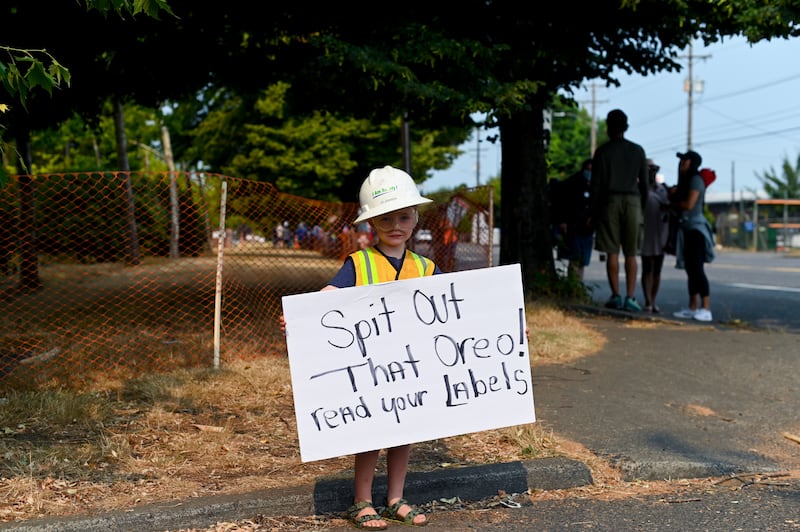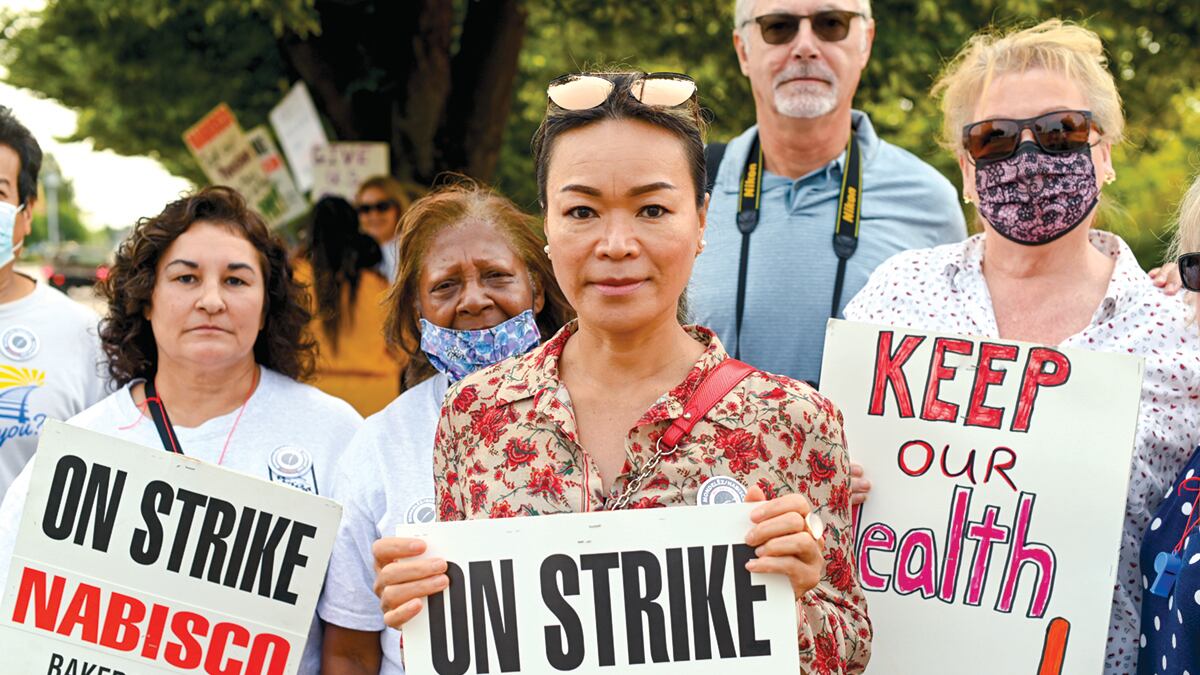By most accounts, the strike by bakers of Ritz crackers along Northeast Columbia Boulevard gained national prominence after a gift of oranges and bananas.
The fruit donor was Jamie Partridge, a retired mail carrier who cut his teeth with organized labor by leading rallies against the dismantling of the U.S. Postal Service by Trump-appointed Postmaster General Louis DeJoy. Partridge, 72, arrived at the picket lines Aug. 10, the day the strike began, with a basket of oranges. He saw, in the Nabisco workers’ demands for a better contract from owner Mondelez International, the seeds for a larger revolt.
“If Jamie hadn’t walked by one day and seen us, I don’t know if we would’ve gotten this big,” says Donna Marks, a member of the bakers’ union. “We were so tired of doughnuts, and then he came along and brought fruit.”
That’s a metaphor: Members of Bakery, Confectionery, Tobacco Workers and Grain Millers International Union Local 364 now refer to Partridge as “the man who bore fruit.” He brought politicians, too, and Teamsters, and the Portland chapter of the Democratic Socialists of America.
Within two weeks, Partridge moved an obscure struggle for health care coverage and overtime pay into the national spotlight—providing the latest chance for Portlanders to pit their progressive values against corporate America.
“These manufacturing strikes with huge multinational corporations, you’ve got to hit them really hard for a period of time before they cave,” Partridge says.
But it was their union brothers and sisters in other cities who pulled the plug on the standoff.
The monthlong strike came to an end on Saturday—against the will of most Portland workers—when fellow bakers’ union members across the country voted overwhelmingly in favor of adopting the proposed contract that union representatives and Mondelez had drafted during bargaining.
Most Portland union members who struck outside the bakery—just around 200 total—voted against the contract on Sept. 16. They’re still unhappy with its creation of weekend crews that will take overtime opportunities away from weekday workers.
Those Portlanders were the holdout amid a sea of nearly 1,000 bakers’ union members at striking facilities across the country, most of whom cheered the contract.
This week, Portland bakers return to the company they’ve been fighting for over a month.
“I’m going to go in there and do the same job as I’ve always done,” says Local 364 vice president Mike Burlingham. “But we’re going to hold them at arm’s length.”
Reconciliation may prove difficult, after the bakers found themselves caught between provocative tactics by outside activists and a physical crackdown by a strikebreaking crew their bosses hired.
Burlingham feels it’s a bittersweet end. “It’s like dealing with a bully. He’s going to keep pushing you around until you hit him back,” Burlingham says. “Symbolically, it took on a lot of meaning for us and everyone in the working class.”

Portland’s strike wasn’t just the kindling for a nationwide picket—it was far more intense than similar strikes at four other Nabisco facilities.
Two weeks into the strike, bakers’ union members set up by railroad tracks near the factory to stop incoming supply trains carrying oil, flour and sugar from reaching the bakery. Eventually, Portland police kicked strikers off of the Mondelez-owned land.
Outside supporters of the strike soon intensified tactics by blocking vans carrying strikebreaking workers to and from the bakery. They also routinely blocked vans from entering and leaving a parking lot Mondelez had leased miles away, often clashing with security guards hired by the strike staffing company Huffmaster Crisis Response.
Two weeks into the strike, outside protesters set off their car horns and alarms outside of a hotel at midnight where strikebreakers were lodged.
Partridge knew he could bring in outside protesters and advocacy groups to attempt tactics the bakers’ union could get in legal trouble for: “We can wink, nod with union leadership, and go off and do our thing.”
Union members think those outside protesters made Mondelez pay attention: “They’ll get in your face and tell you how to feel. Especially here in Portland, I believe it was a huge boost to getting the company to come to the table,” says Burlingham.
Eddie Mayagoitia, a union member, calls the protesters’ actions “a little extra.”
“Things started getting a little out of control, and we had a plan to meet with Mondelez already,” Mayagoitia says, but adds, “I’m glad some of the things that were happening got people’s attention. If not, there’s just some people standing out there with signs.”
Partridge also took less dramatic steps. He helped build a crowdfunding campaign that supplied $200 a week to each Portland bakers’ union member. And he directed strikers to take their picket line to grocery stores, demonstrating against the offshoring of products they baked, like Ritz crackers and Oreo cookies.
Perhaps most notably, he recruited nearly every prominent Portland Democratic officeholder to the picket line.
He called Oregon House Speaker Tina Kotek, who marched alongside strikers to the nearby Fred Meyer to chant outside. Portland City Commissioner Jo Ann Hardesty made an impassioned speech about the power of labor unions; state Rep. Khanh Pham, Sen. Lew Frederick and Multnomah County Commissioner Susheela Jayapal all joined picketers outside the bakery.
“Having politicians headline rallies catches the media,” Partridge says. “But also, politicians want to be seen. It works both ways.”
Hardesty said she would stand with the union again: “Anytime a group of workers collectively organize and decide to strike, it is significant for our labor movement because an injury to one is an injury to all.”
National workers experienced little of this. They broke with Portlanders because they felt Mondelez’s latest offer met most of the union’s demands: It offered the same health care plan as before and doubled the company’s 401(k) match. It increased disability benefits and offered first dibs on weekend schedules to existing workers. It wasn’t perfect, they conceded, but it was acceptable.
But workers in places like Richmond, Va., didn’t experience the crackdown Mondelez attempted in Portland.
During the last few weeks of the strike, protesters and members of other unions supporting the bakers alleged that security guards hired by Mondelez were getting violent: pushing, shoving and threatening them while they blocked incoming vans and buses. A Teamster named Jesse Dreyer even filed a federal lawsuit, alleging assault by a security guard who squashed him up against a van for several minutes and struck him repeatedly.
Jesus Martinez, president of the local bakers’ union, hints at the distrust a month of confrontation has planted in Nabisco workers.
“It’s still going to be a fight for four years,” Martinez says. “Even though the company says they want it to be harmonious, that’s if they respect the contract. But they never have and they never will.”

